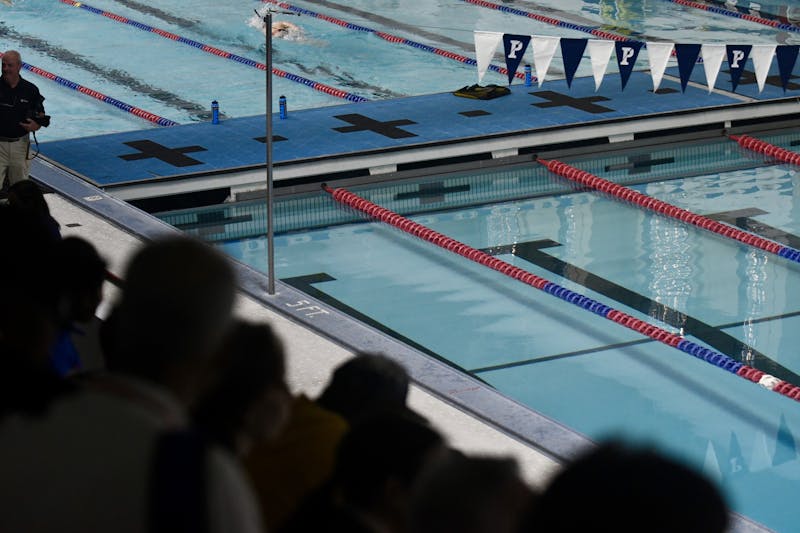The 1990s began as the "environmental decade," when students on 2,000 campuses nationwide organized events and recycling programs for Earth Day, the largest organized student demonstration in history. But the hopes of Earth Day have not been realized and the expectations raised by the pro-environmental promises of the current administration have been lowered as this Congress has been the most hostile toward the environment since the original Earth Day in 1970. Many students at Penn are working with Campus Green Vote, which is part of the national effort of Youth Vote '94. Together, they are committed to the involvement of young people in democracy and are working to register over a quarter of a million people to vote in this election year. Campus Green Vote focuses on increasing the environmental awareness of young people. As a non-partisan group, we do not endorse any candidates, but we do seek to make voters aware of the environmental stances of the candidates, and urge them to vote for the candidates they feel are more sensitive to environmental issues. The congressional issues we are focusing on are the Clean Water Act, the Safe Drinking Water Act and the Endangered Species Act. The Clean Water Act, enacted in 1972 to eliminate the discharge of pollutants in our waterways and make our waves "swimmable and fishable" needs to be reauthorized and strengthened. Currently, 30 percent of our rivers and more than 50 percent of our lakes are not safe for swimming or fishing and half the states have issued health advisories urging only limited consumption of fish due to mercury contamination. According to the U.S. Public Interest Research Group, 97% of the nation's largest industrial discharges violated their discharge permits in 1990. In addition, the lobbying efforts of the chemical manufacturers have crippled strong legislation: 268 political action committees connected to companies lobbying against a strengthened Clean Water Act, gave $56 million to Congressional candidates between 1987 and 1993. The Safe Drinking Water Act, passed to protect citizens by preventing contamination of public water supplies, is being violated in every state. In the two years it has taken Congress to try to reauthorize the bill, the Centers for Disease Control and Prevention estimate that over 1.8 million people became sick and more than 1,800 died from drinking contaminated water. The most serious example was in 1993 when 400,000 people in Milwaukee became sick from contaminated tap water and more than 100 people died. The Endangered Species Act, our nation's most fundamental tool to protect species threatened with extinction, has saved hundreds of species which are often the source of new pharmaceuticals. One example is the Pacific Yew tree, found in Oregon and Washington. The Yew contains taxol, currently used to treat breast cancer. Yet the deceptively named "wise use" movement, a coalition of anti-environmental corporations are working to cut the act. It is important to know where the local candidates stand on these important issues. The candidates for governor are Republican Tom Ridge and Democrat Mark Singel. Ridge has proposed federal legislation to allow a site-by-site determination on the extent of cleanup necessary, which would limit a landowner's future liability after initial cleanup efforts are completed, and would allow varying levels of cleanup efforts depending on the intended use of the site. His Congressional voting record vs. the League of Conservation Voters, a non-partisan environmental action group was 20% in 1993 and 13% in 1991-92 (100% would indicate support in every environmental vote). Ridge is not endorsed by the Sierra Club because he supports weakening of the Pennsylvania Department of Environmental Resources, opposes existing and proposed legislation that would lead to cleaner air, and he voted against or was absent on 16 out of 20 crucial environmental votes. Singel, the incumbent, is a supporter of new taxes on polluters. He initiated a "buy recycled" pledge campaign in which local companies and business organizations agree to set goals in the amount of recycled goods they purchase over the course of a year. He supports the fund designed to protect Michigan's Great Lakes. As chairman of the Pennsylvania Energy Office, he promoted marketing and public acceptance of electric vehicles. He is endorsed by the Sierra Club because he wants to strengthen the Department of Environmental Resources and he supports existing highway trust funds for public transportation. The candidates for the highly contested senatorial seat are incumbent Democrat Harris Wofford and current Congressional Representative, Republican Rick Santorum. Wofford has worked to protect Pennsylvania state parks and forests from the harmful effects of planes flown out of nearby military bases, and has attempted to limit out of state trash imports. He supports international cooperation in protecting the environment and the incorporation of environmental concerns in trade agreements. He is also endorsed by the Sierra Club. He voted in favor of the Safe Drinking Water Act and he voted for the passage of the Endangered Species Act, which Santorum voted against. Wofford's Congressional Voting Record vs. the League of Conservation Voters was 94% in 1993, 67% in 1992 and 86% in 1991, while Santorum's record was 25% in 1993, 19% in 1992, and 0% in 1991. Santorum believes that the best way to reach environmental goals is with the use of economic incentives. He also advocates flexibility for state and local governments in addressing environmental contamination. Santorum thinks the economic security of industries should be considered when legislating environmental goals. The debate around these critical environmental issues will continue into the next Congress. Voters have a unique opportunity this election to turn the tide in protecting our health, our water and our eco-systems. Young voters will be leading the charge, just as they did in 1992, when over two million new young voters turned out to the polls, resulting in the largest increase in youth turn-out since 18 year-olds were first given the right to vote. Campus Green Vote urges you to take a few minutes out of your day tomorrow and take the time to vote. And when you do, consider the stances of the candidates on these important environmental issues. David Lagstein is a College senior from Franklin Lakes, New Jersey. He is a member of Campus Green Vote.
The Daily Pennsylvanian is an independent, student-run newspaper. Please consider making a donation to support the coverage that shapes the University. Your generosity ensures a future of strong journalism at Penn.
DonatePlease note All comments are eligible for publication in The Daily Pennsylvanian.







